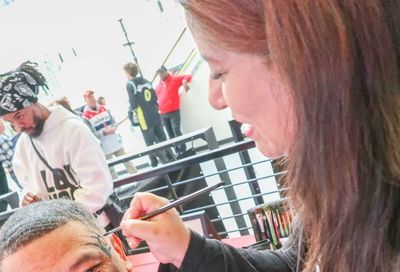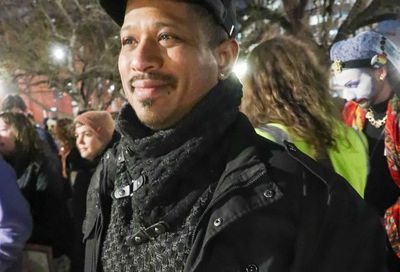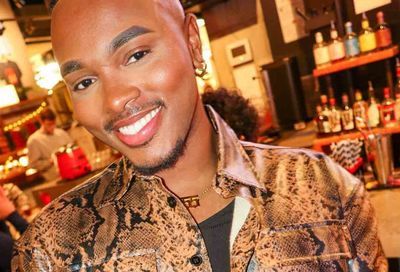A Far Cry
Commentary: Alphabet Soup
Among the tears shed this Election Day were those of my friend Gerrit, who is five and who really hoped with all of his heart that John Kerry would pull off a victory.
Gerrit and I agree on many things, including how much fun it is to jump out of a hiding place and yell “Boo!” at someone else. We agree on religion, inasmuch as Gerrit has an opinion about religion; we’re both Unitarian Universalists, which is how we met. He was in my preschool religious education class for two years, and his mom is on my teaching team.
Shortly after the first debate between Kerry and George W. Bush, Gerrit’s mom told me how her family had all watched the debate together, including Gerrit, the youngest child (another thing we have in common). She told me that he was a huge Kerry fan, an opinion perhaps influenced by his parents and older siblings, but perfectly legitimate nonetheless given that many Bush supporters have a five-year-old’s ability to reason.
She said that whenever Gerrit spotted a Bush-Cheney yard sign, he’d lament, “Why?” When I saw him that morning, I asked who he was going to vote for in the presidential election. “John Kerry!” he told me. “Me too!” I told him.
When the dust had settled after Election Day, I asked Gerrit’s mom in an e-mail how he took the news. “He cried,” she wrote. “But then, so did a lot of us.” She told me that Gerrit had dressed as George Bush for Halloween, and his older sister dressed as Dick Cheney, which made for an amusing photograph of the vice presidential clone carrying the W look-alike in his arms.
Hearing about Gerrit’s experience with the first presidential election he can remember reminded me my earliest experiences with election-related disappointment. When I turned six in the summer of 1976, Gerald Ford was running for president against Jimmy Carter, and for some reason my almost-nine-year-old brother (a good little future Republican) had decided to support Ford. I figured I could trust him, so I supported Ford too. I don’t remember if I cried that night when Carter won.
I also don’t remember whether I hoped for Carter’s re-election or was satisfied with Reagan’s win. I hate to say it, but there’s a good chance that I didn’t really care, especially if my brother hadn’t force-fed me an opinion that year.
By 1984, though, I had somehow become a Democrat. It might have been from hanging around with my dad on weekends, when he’d take me along with him to put up yard signs for Democratic candidates on willing voters’ lawns. He also took me to a reception to meet Tom Harkin when I was 12 or 13, while the future senator was still in the House and about to announce his candidacy for Senate. Whatever happened, by the time Election Night 1984 rolled around, I was staunchly Democratic.
I remember sitting up that evening watching the returns roll in as the networks lit up a color-coded map of the United States. Back then you didn’t have to stay up all night to find out who would be the president, and you didn’t have a sinking feeling of fraud, doom, or a lethal combination of the two when the concession speech was over. Back then, kiddies, we knew that night who had won the presidency and it was never in question.
Imagine my surprise when my beloved Walter Mondale –whose short-haired feminist woman running mate made him a natural favorite for the young lesbian set — lost by such a humiliating margin.
I remember sitting in front of the television, watching all these states go red on the screen, and cheering when they called D.C. for Mondale. I thought this was a sign of momentum, of good things to come; I was 14 and I lived in Iowa, for god’s sake. I didn’t know D.C. always voted Democratic. A couple of hours later, they called Minnesota for Mondale, but by then I was worried. Sure enough, that was where the Mondale momentum stopped, at 13 electoral votes, leaving at least one Iowa girl’s broken heart in its wake.
I recounted this story recently to a friend who’s in her fifties. She told me, laughing, that I was the only person in the nation who didn’t know that night that Walter Mondale would lose that election.
I couldn’t help it — I had faith, I had hope, I had naïveté. I was nine years older than Gerrit is now, but I still had his childlike sense of belief that what’s right can and will prevail.
Two years later I volunteered for the election campaign of a Democrat hoping to unseat Iowa’s sitting Republican governor. I spent time at the campaign headquarters in my town and spent the evening of Election Day phoning up voters and asking if they needed a ride to the polls. I did everything I could as a 16-year-old, but our guy lost as surely as Walter Mondale had two years earlier.
What struck me that night was watching the volunteer coordinator, who’d been ordering me around for weeks and was functioning as my beacon of Democratic gubernatorial hope, sob as she watched the election returns on the local news. It was that night that I observed firsthand the heartbreak of being an adult Democrat.
Two decades later, I’m not sure I’ve entirely abandoned the political faith, hope or naïveté of my youth; like many optimistic Kerry supporters, I read the exit polls when they were posted by cavalier bloggers last Tuesday afternoon and promptly told my friends we’d be OK, that Kerry was going to win after all.
I was wrong, as I told them the next day. Unlike Gerrit, nobody saw me cry. Unlike Gerrit, I issued a post-election analysis to anyone who asked that, though brief, would earn someone Gerrit’s age a bar of soap in his mouth. Or maybe it’d simply earn him a “time out”; we’re Unitarians, after all, Gerrit and I. Hopeless Unitarian Democrats, ready for 2008, desperate not to have to cry again.
Kristina Campbell votes in Takoma Park, Md. “Alphabet Soup” appears biweekly and its author can be reached at kcampbell@metroweekly.com.
Support Metro Weekly’s Journalism
These are challenging times for news organizations. And yet it’s crucial we stay active and provide vital resources and information to both our local readers and the world. So won’t you please take a moment and consider supporting Metro Weekly with a membership? For as little as $5 a month, you can help ensure Metro Weekly magazine and MetroWeekly.com remain free, viable resources as we provide the best, most diverse, culturally-resonant LGBTQ coverage in both the D.C. region and around the world. Memberships come with exclusive perks and discounts, your own personal digital delivery of each week’s magazine (and an archive), access to our Member's Lounge when it launches this fall, and exclusive members-only items like Metro Weekly Membership Mugs and Tote Bags! Check out all our membership levels here and please join us today!




















